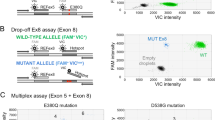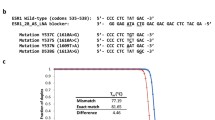Abstract
Purpose
Therapeutic efficacy of hormonal therapies to target estrogen receptor (ER)-positive breast cancer is limited by the acquisition of ligand-independent ESR1 mutations, which confer treatment resistance to aromatase inhibitors (AIs). Monitoring for the emergence of such mutations may enable individualized therapy. We thus assessed CTC- and ctDNA-based detection of ESR1 mutations with the aim of evaluating non-invasive approaches for the determination of endocrine resistance.
Patients and methods
In a prospective cohort of 55 women with hormone receptor-positive metastatic breast cancer, we isolated circulating tumor cells (CTCs) and developed a high-sensitivity method for the detection of ESR1 mutations in these CTCs. In patients with sufficient plasma for the simultaneous extraction of circulating tumor DNA (ctDNA), we performed a parallel analysis of ESR1 mutations using multiplex droplet digital PCR (ddPCR) and examined the agreement between these two platforms. Finally, we isolated single CTCs from a subset of these patients and reviewed RNA expression to explore alternate methods of evaluating endocrine responsiveness.
Results
High-sensitivity ESR1 sequencing from CTCs revealed mono- and oligoclonal mutations in 22% of patients. These were concordant with plasma DNA sequencing in 95% of cases. Emergence of ESR1 mutations was correlated both with time to metastatic relapse and duration of AI therapy following such recurrence. The Presence of an ESR1 mutation, compared to ESR1 wild type, was associated with markedly shorter Progression-Free Survival on AI-based therapies (p = 0.0006), but unaltered to other non-AI-based therapies (p = 0.73). Compared with ESR1 mutant cases, AI-resistant CTCs with wild-type ESR1 showed an elevated ER-coactivator RNA signature, consistent with their predicted response to second-line hormonal therapies.
Conclusion
Blood-based serial monitoring may guide the selection of precision therapeutics for women with AI-resistant ER-positive breast cancer.




Similar content being viewed by others
Data availability
Additional data available on request from the authors.
References
Li S, Shen D, Shao J, Crowder R, Liu W, Prat A, He X, Liu S, Hoog J, Lu C et al (2013) Endocrine-therapy-resistant ESR1 variants revealed by genomic characterization of breast-cancer-derived xenografts. Cell Rep 4(6):1116–1130
Robinson DR, Wu YM, Vats P, Su F, Lonigro RJ, Cao X, Kalyana-Sundaram S, Wang R, Ning Y, Hodges L et al (2013) Activating ESR1 mutations in hormone-resistant metastatic breast cancer. Nat Genet 45(12):1446–1451
Toy W, Shen Y, Won H, Green B, Sakr RA, Will M, Li Z, Gala K, Fanning S, King TA et al (2013) ESR1 ligand-binding domain mutations in hormone-resistant breast cancer. Nat Genet 45(12):1439–1445
Jeselsohn R, Yelensky R, Buchwalter G, Frampton G, Meric-Bernstam F, Gonzalez-Angulo AM, Ferrer-Lozano J, Perez-Fidalgo JA, Cristofanilli M, Gomez H et al (2014) Emergence of constitutively active estrogen receptor-alpha mutations in pretreated advanced estrogen receptor-positive breast cancer. Clin Cancer Res 20(7):1757–1767
Yu M, Bardia A, Aceto N, Bersani F, Madden MW, Donaldson MC, Desai R, Zhu H, Comaills V, Zheng Z et al (2014) Cancer therapy. Ex vivo culture of circulating breast tumor cells for individualized testing of drug susceptibility. Science 345(6193):216–220
Merenbakh-Lamin K, Ben-Baruch N, Yeheskel A, Dvir A, Soussan-Gutman L, Jeselsohn R, Yelensky R, Brown M, Miller VA, Sarid D et al (2013) D538G mutation in estrogen receptor-alpha: a novel mechanism for acquired endocrine resistance in breast cancer. Can Res 73(23):6856–6864
Jeselsohn R, Buchwalter G, De Angelis C, Brown M, Schiff R (2015) ESR1 mutations-a mechanism for acquired endocrine resistance in breast cancer. Nat Rev Clin Oncol 12(10):573–583
Ozkumur E, Shah AM, Ciciliano JC, Emmink BL, Miyamoto DT, Brachtel E, Yu M, Chen PI, Morgan B, Trautwein J et al (2013) Inertial focusing for tumor antigen-dependent and -independent sorting of rare circulating tumor cells. Sci Transl Med 5(179):179ra147
Schiavon G, Hrebien S, Garcia-Murillas I, Cutts RJ, Pearson A, Tarazona N, Fenwick K, Kozarewa I, Lopez-Knowles E, Ribas R et al (2015) Analysis of ESR1 mutation in circulating tumor DNA demonstrates evolution during therapy for metastatic breast cancer. Sci Transl Med 7(313):313ra182
Ebright RY, Lee S, Wittner BS, Niederhoffer KL, Nicholson BT, Bardia A, Truesdell S, Wiley DF, Wesley B, Li S et al (2020) Deregulation of ribosomal protein expression and translation promotes breast cancer metastasis. Science 367(6485):1468–1473
Chandarlapaty S, Chen D, He W, Sung P, Samoila A, You D, Bhatt T, Patel P, Voi M, Gnant M et al (2016) Prevalence of ESR1 mutations in cell-free DNA and outcomes in metastatic breast cancer: a secondary analysis of the BOLERO-2 clinical trial. JAMA Oncol 2(10):1310–1315
Ting DT, Wittner BS, Ligorio M, Vincent Jordan N, Shah AM, Miyamoto DT, Aceto N, Bersani F, Brannigan BW, Xega K et al (2014) Single-cell RNA sequencing identifies extracellular matrix gene expression by pancreatic circulating tumor cells. Cell Rep 8(6):1905–1918
Chen D, Ma H, Hong H, Koh SS, Huang SM, Schurter BT, Aswad DW, Stallcup MR (1999) Regulation of transcription by a protein methyltransferase. Science (New York, NY) 284(5423):2174–2177
Chen D, Huang SM, Stallcup MR (2000) Synergistic, p160 coactivator-dependent enhancement of estrogen receptor function by CARM1 and p300. J Biol Chem 275(52):40810–40816
Frietze S, Lupien M, Silver PA, Brown M (2008) CARM1 regulates estrogen-stimulated breast cancer growth through up-regulation of E2F1. Can Res 68(1):301–306
Kwan TT, Bardia A, Spring LM, Giobbie-Hurder A, Kalinich M, Dubash T, Sundaresan T, Hong X, LiCausi JA, Ho U et al (2018) A digital RNA signature of circulating tumor cells predicting early therapeutic response in localized and metastatic breast cancer. Cancer Discov 8(10):1286–1299
Guttery DS, Page K, Hills A, Woodley L, Marchese SD, Rghebi B, Hastings RK, Luo J, Pringle JH, Stebbing J et al (2015) Noninvasive detection of activating estrogen receptor 1 (ESR1) mutations in estrogen receptor-positive metastatic breast cancer. Clin Chem 61(7):974–982
Sefrioui D, Perdrix A, Sarafan-Vasseur N, Dolfus C, Dujon A, Picquenot JM, Delacour J, Cornic M, Bohers E, Leheurteur M et al (2015) Short report: monitoring ESR1 mutations by circulating tumor DNA in aromatase inhibitor resistant metastatic breast cancer. Intl J Cancer 137(10):2513–2519
Chu D, Paoletti C, Gersch C, VanDenBerg DA, Zabransky DJ, Cochran RL, Wong HY, Toro PV, Cidado J, Croessmann S et al (2016) ESR1 mutations in circulating plasma tumor DNA from metastatic breast cancer patients. Clin Cancer Res 22(4):993–999
Takeshita T, Yamamoto Y, Yamamoto-Ibusuki M, Inao T, Sueta A, Fujiwara S, Omoto Y, Iwase H (2016) Clinical significance of monitoring ESR1 mutations in circulating cell-free DNA in estrogen receptor positive breast cancer patients. Oncotarget 7(22):32504–32518
Gyanchandani R, Kota KJ, Jonnalagadda AR, Minteer T, Knapick BA, Oesterreich S, Brufsky AM, Lee AV, Puhalla SL (2016) Detection of ESR1 mutations in circulating cell-free DNA from patients with metastatic breast cancer treated with palbociclib and letrozole. Oncotarget 8(40):66901–66911
Fribbens C, O’Leary B, Kilburn L, Hrebien S, Garcia-Murillas I, Beaney M, Cristofanilli M, Andre F, Loi S, Loibl S et al (2016) Plasma ESR1 mutations and the treatment of estrogen receptor-positive advanced breast cancer. J Clin Oncol 34(25):2961–2968
Paolillo C, Mu Z, Rossi G, Schiewer MJ, Nguyen T, Austin L, Capoluongo E, Knudsen K, Cristofanilli M, Fortina P (2017) Detection of activating estrogen receptor gene (ESR1) mutations in single circulating tumor cells. Clin Cancer Res 23(20):6086–6093
Beije N, Sieuwerts AM, Kraan J, Van NM, Onstenk W, Vitale SR, van der Vlugt-Daane M, Dirix LY, Brouwer A, Hamberg P et al (2018) Estrogen receptor mutations and splice variants determined in liquid biopsies from metastatic breast cancer patients. Mol Oncol 12(1):48–57
Ye Z, Wang C, Wan S, Mu Z, Zhang Z, Abu-Khalaf MM, Fellin FM, Silver DP, Neupane M, Jaslow RJ et al (2019) Association of clinical outcomes in metastatic breast cancer patients with circulating tumour cell and circulating cell-free DNA. Eur J Cancer 106:133–143
Sundaresan TK, Sequist LV, Heymach JV, Riely GJ, Janne PA, Koch WH, Sullivan JP, Fox DB, Maher R, Muzikansky A et al (2016) Detection of T790M, the acquired resistance EGFR mutation, by tumor biopsy versus noninvasive blood-based analyses. Clin Cancer Res 22(5):1103–1110
Rugo HS, Rumble RB, Macrae E, Barton DL, Connolly HK, Dickler MN, Fallowfield L, Fowble B, Ingle JN, Jahanzeb M et al (2016) Endocrine therapy for hormone receptor-positive metastatic breast cancer: American Society of Clinical Oncology guideline. J Clin Oncol 34(25):3069–3103
Magnani L, Frige G, Gadaleta RM, Corleone G, Fabris S, Kempe MH, Verschure PJ, Barozzi I, Vircillo V, Hong SP et al (2017) Acquired CYP19A1 amplification is an early specific mechanism of aromatase inhibitor resistance in ERalpha metastatic breast cancer. Nat Genet 49(3):444–450
Osborne CK, Bardou V, Hopp TA, Chamness GC, Hilsenbeck SG, Fuqua SA, Wong J, Allred DC, Clark GM, Schiff R (2003) Role of the estrogen receptor coactivator AIB1 (SRC-3) and HER-2/neu in tamoxifen resistance in breast cancer. J Natl Cancer Inst 95(5):353–361
Song X, Chen J, Zhao M, Zhang C, Yu Y, Lonard DM, Chow DC, Palzkill T, Xu J, O’Malley BW et al (2016) Development of potent small-molecule inhibitors to drug the undruggable steroid receptor coactivator-3. Proc Natl Acad Sci USA 113(18):4970–4975
Acknowledgements
The authors are grateful to all the patients who participated in this study. We thank L. Libby for administrative support.
Funding
This work was supported by Grants from National Institute of Health (2RO1CA129933 to D.A.H, 2U01EB012493 to M.T, D.A.H, S.M, 5U01EB012493 to M.T, 5P41EB002503 to M.T), Susan G Komen Foundation (CCR15224703 to A.B), Howard Hughes Medical Institute (to D.A.H), ESSCO Breast Cancer Research Fund (to S.M), National Foundation for Cancer Research (to D.A.H), and the MGH-Johnson & Johnson Center for Excellence in CTCs (to M. Toner, S. Maheswaran). T. Sundaresan was supported by a Federal Share Research Career Development Award (K12CA087723) and a Santander Cancer Research Fellowship. N. Aceto was supported by the Human Frontiers Science Program, the Swiss National Science Foundation, and the Swiss Foundation for Grants in Biology and Medicine.
Author information
Authors and Affiliations
Contributions
TKS, SM, and DAH conceived the project and provided leadership for the project. TKS, ZZ, TDD, NA, EJS, DBS, ML, RK, JI, SM, and DAH carried out experiments and/or analyzed data. BSW provided guidance and help in computational and statistical analyses. AB and JI provided clinical annotation and guidance. MT developed CTC-iChip technology for CTC isolation. TKS, TDD, SM, and DAH wrote the manuscript. All authors discussed results and provided input and edits on the manuscript.
Corresponding authors
Ethics declarations
Conflict of interests
Massachusetts General Hospital (MGH) has applied for patents regarding the CTCi-Chip technology, CTC detection signatures, and Enrich-seq technology. M.T, S.M, and D.A.H are cofounders and have equity in Tell-Bio, which is not related to this work. J.I and Z.Z hold equity in ArcherDx. A.B holds Consultant/advisory board position: Genentech/Roche, Immunomedics, Novartis, Pfizer, Merck, Radius Health, Spectrum Pharma, Taiho Pharm, Diiachi-Astra Zeneca, Eli Lilly, Sanofi, Puma, Foundation Medicine, and Phillips. Contracted research: Genentech/Roche, Immunomedics, Novartis, Pfizer, Merck, Radius Health, Sanofi, and Biothernostics. All authors’ interests were reviewed and are managed by MGH and Partners HealthCare in accordance with their conflict of interest policies.
Ethical approval
Patients provided written informed consent to an Institutional Review Board approved blood collection protocol (DF/HCC 05-300).
Additional information
Publisher's Note
Springer Nature remains neutral with regard to jurisdictional claims in published maps and institutional affiliations.
Supplementary Information
Below is the link to the electronic supplementary material.
Rights and permissions
About this article
Cite this article
Sundaresan, T.K., Dubash, T.D., Zheng, Z. et al. Evaluation of endocrine resistance using ESR1 genoty** of circulating tumor cells and plasma DNA. Breast Cancer Res Treat 188, 43–52 (2021). https://doi.org/10.1007/s10549-021-06270-z
Received:
Accepted:
Published:
Issue Date:
DOI: https://doi.org/10.1007/s10549-021-06270-z




